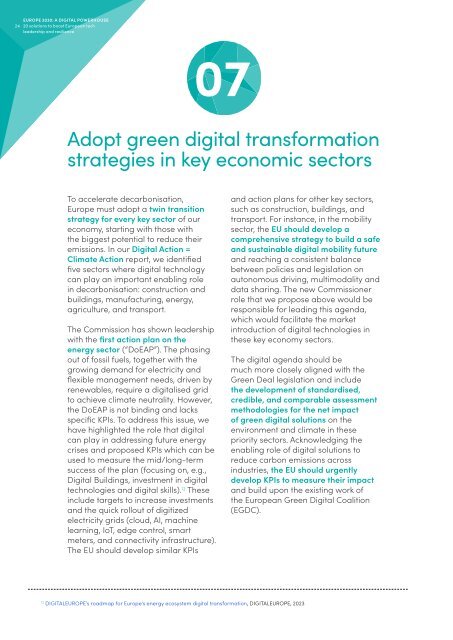DIGITALEUROPE - EUROPE 2030 A DIGITAL POWERHOUSE FINAL WEB_PBP
You also want an ePaper? Increase the reach of your titles
YUMPU automatically turns print PDFs into web optimized ePapers that Google loves.
24<br />
<strong>EUROPE</strong> <strong>2030</strong>: A <strong>DIGITAL</strong> <strong>POWERHOUSE</strong><br />
20 solutions to boost European tech<br />
leadership and resilience<br />
07<br />
Adopt green digital transformation<br />
strategies in key economic sectors<br />
To accelerate decarbonisation,<br />
Europe must adopt a twin transition<br />
strategy for every key sector of our<br />
economy, starting with those with<br />
the biggest potential to reduce their<br />
emissions. In our Digital Action =<br />
Climate Action report, we identified<br />
five sectors where digital technology<br />
can play an important enabling role<br />
in decarbonisation: construction and<br />
buildings, manufacturing, energy,<br />
agriculture, and transport.<br />
The Commission has shown leadership<br />
with the first action plan on the<br />
energy sector (“DoEAP”). The phasing<br />
out of fossil fuels, together with the<br />
growing demand for electricity and<br />
flexible management needs, driven by<br />
renewables, require a digitalised grid<br />
to achieve climate neutrality. However,<br />
the DoEAP is not binding and lacks<br />
specific KPIs. To address this issue, we<br />
have highlighted the role that digital<br />
can play in addressing future energy<br />
crises and proposed KPIs which can be<br />
used to measure the mid/long-term<br />
success of the plan (focusing on, e.g.,<br />
Digital Buildings, investment in digital<br />
technologies and digital skills). 12 These<br />
include targets to increase investments<br />
and the quick rollout of digitized<br />
electricity grids (cloud, AI, machine<br />
learning, IoT, edge control, smart<br />
meters, and connectivity infrastructure).<br />
The EU should develop similar KPIs<br />
and action plans for other key sectors,<br />
such as construction, buildings, and<br />
transport. For instance, in the mobility<br />
sector, the EU should develop a<br />
comprehensive strategy to build a safe<br />
and sustainable digital mobility future<br />
and reaching a consistent balance<br />
between policies and legislation on<br />
autonomous driving, multimodality and<br />
data sharing. The new Commissioner<br />
role that we propose above would be<br />
responsible for leading this agenda,<br />
which would facilitate the market<br />
introduction of digital technologies in<br />
these key economy sectors.<br />
The digital agenda should be<br />
much more closely aligned with the<br />
Green Deal legislation and include<br />
the development of standardised,<br />
credible, and comparable assessment<br />
methodologies for the net impact<br />
of green digital solutions on the<br />
environment and climate in these<br />
priority sectors. Acknowledging the<br />
enabling role of digital solutions to<br />
reduce carbon emissions across<br />
industries, the EU should urgently<br />
develop KPIs to measure their impact<br />
and build upon the existing work of<br />
the European Green Digital Coalition<br />
(EGDC).<br />
12<br />
<strong><strong>DIGITAL</strong><strong>EUROPE</strong></strong>’s roadmap for Europe’s energy ecosystem digital transformation, <strong><strong>DIGITAL</strong><strong>EUROPE</strong></strong>, 2023



